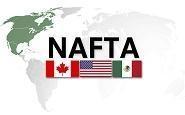Government/Policy

December 15, 2017
Chorus of Voices Unite to Oppose NAFTA Withdrawal
Written by Sandy Williams
It’s a real possibility the United States may withdraw from the North American Free Trade Agreement. Despite pleas from Republican and Democratic senators, agriculture industry leaders, automotive executives, the United Steelworkers, trucking associations and many others, President Trump, Trade Representative Robert Lighthizer and Commerce Secretary Wilbur Ross appear undeterred in their march to tear up the agreement.
Congressman Will Hurd (R-TX) is leading a group of pro-trade lawmakers who urge the president not to withdraw from NAFTA. Hurd says there’s one power out there the administration might listen to—Wall Street. Trump has been proud of the soaring stock market, taking most of the credit for the growth that began during the Obama administration. Hurd spoke to a gathering at the Wilson Center in Washington last week and said that if tax cuts pass, the market will continue its bull run. What could end it, he said, is “screwing up NAFTA.”
“I think there’s one thing that would influence those three people that are going to make this decision. And that’s the markets,” said Hurd.
The New York financial sector doesn’t seem worried and expects NAFTA 2.0 to be signed, he said. But markets lag behind political threats and Wall Street, with its focus on tax reform, is feeling a false sense of security. Hurd called on Wall Street to step up and use its influence to save the agreement.
A group of Republican governors plan to approach the White House directly after efforts by Congress failed to bring moderation to the U.S. NAFTA proposals. Governors met with Vice President Mike Pence, Lighthizer and National Economic Council Director Gary Cohn in Austin in November in what was supposed to be a briefing on tax reform. The governors instead pressed Pence to ask Trump to change course on NAFTA.
Inside U.S. Trade reported a group of governors plan to visit the White House to make their case, as well as sending a letter to President Trump.
Iowa Gov. Kim Reynolds and Arkansas Gov. Asa Hutchinson are taking the lead in circulating the letter and collecting signatures. A draft seen by Inside U.S. Trade said that NAFTA has resulted in “big gains” for the United States, and withdrawal from the agreement would be a “self-inflicted wound.”
At a meeting of the Washington International Trade Association, Sen. Pat Roberts (R-AR) discussed the importance of NAFTA to the agriculture industry.
“Last week, I stated that we are at a crossroads on trade. If the U.S. is to continue both as a leader in the global market and to grow the American economy, then we must aggressively work to strengthen existing relationships and develop new ones. No one knows more than the agriculture sector the rewards that come from our trading partners. I believe that agriculture should be front and center as the U.S. pursues trading opportunities around the world.”
Roberts said that he has raised NAFTA with Trump several times, noting that farming states supported his election, not just manufacturing states.
Referring to a possible withdrawal from NAFTA, Roberts told Trump, “For goodness sake, don’t start the clock on termination. That sends a lot of signals we just don’t need to be sending. We do that and we’re going to see economic shivers all up and down the food chain.”
In comments on the Senate floor Thursday, Sen. Jeff Flake (R-AZ) blasted the idea of withdrawing from NAFTA. Flake agreed with Senate Agriculture Chairman Pat Roberts (R-KS) that terminating NAFTA would be crippling to the agricultural industry.
“This threat of a dangerous trade deficit leaving Americans behind is nothing more than a myth,” said Flake. “These folks also seem to think terminating NAFTA will have no lasting impact on the nation or its economy. These attitudes could not be further from the truth.”
“An America without NAFTA is one crippled by subsidies,” he said, according to a transcript of his remarks issued by his office. “I agree with my colleague from Kansas, and the Senate Agriculture Committee Chairman, Senator Roberts. He recently explained that withdrawal from NAFTA would add to farmers’ demands for increased farm subsidies at a time when Congress simply cannot afford that.”
NAFTA negotiators are in Washington this week for an intercessional meeting to prepare for round six of the negotiations Jan. 23-28 in Montreal.







